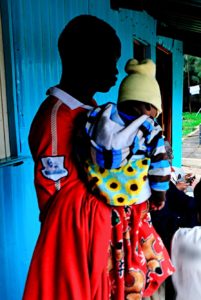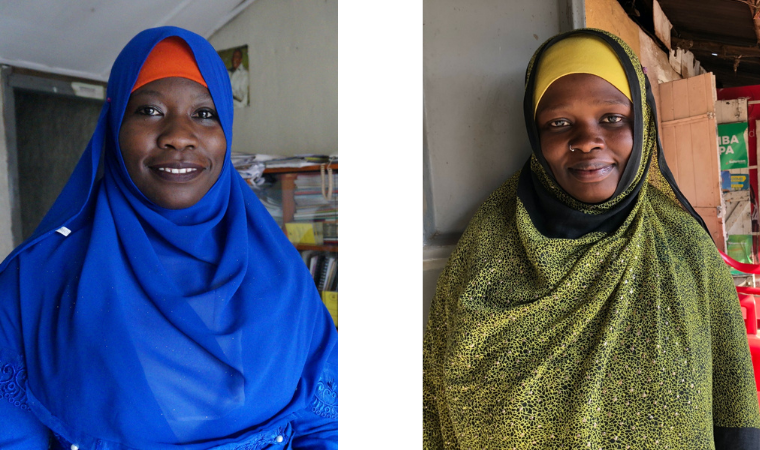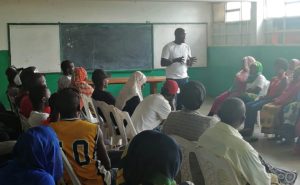Stories
Ziya’s Story: From Fighting for ID to Fighting the System
At 16, in her first year of high school, Ziya* gave birth. Just as she was learning how to be a mother to her son, her own mother died. “Things were bad,” recalls Ziya. “My mother was helping me raise the boy so that I could go to school. Now I was alone; I became his mother and father.”

A man stands with a child in the shadows of the registrar’s office in Kibera.
Ziya had no choice but to drop out of school to fend for her son. She took on casual jobs in Kibera, the low-income area in Nairobi where she lives, but they did not pay enough to sustain a family of two.
At 18, Ziya tried to find domestic work in a wealthy neighborhood nearby, but no one would give her a chance without identification. “Petty theft by casual laborers is rampant, so everybody is cautious about who they let into their home,” explains Ziya.
This much became clear: if she wanted to provide for her son, she had to get her national ID card.
Ziya submitted the required paperwork at the registrar’s office in Kibera and was told to come back in a month for “vetting”. Vetting is a process whereby individuals of certain ethnicities go before a committee of security personnel and local leaders who ask them questions to determine if they are ‘truly Kenyan’. Ziya, being a Muslim of Nubian descent, is among the approximately 5 million citizens who have been subjected to this unconstitutional process.
“What angered me the most is how they treated me,” recalls Ziya. “The committee knew me, my mother and my grandmother, but they made me come before them for vetting over ten times. My Christian friends leave with a waiting card on their first trip to the registrar’s office. The next trip they make is to collect their ID cards.”
Despite the hurdles, Ziya persisted, trying for over three years to secure her rightful ID.
During this time, her son turned school age. Ziya enrolled him in a private school. It was expensive, but it was the only way he could get an education. While government schools in Kenya are free, they need to see both the child’s and the parents’ identification. Ziya had neither: she kept being denied her own national ID card and without that, she couldn’t secure her son’s birth certificate.
On seeing that Ziya was struggling with the fees, the private school found her son a sponsor. But the relief it brought was short-lived. Upon learning that Ziya and her son did not have identity documents, the sponsor withdrew their commitment. “The sponsorship would have made a big difference in our lives,” says Ziya. “Besides my son’s school fees, the sponsor had offered to cater for our food and rent.”
Ziya had all but given up hope until she met Zena and Zahra, community paralegals with Nubian Rights Forum (NRF), a partner of Namati Kenya. They helped her understand her citizenship rights and supported her in navigating the complex system and vetting process. Finally, Ziya got her ID.

Community paralegals Zena (left) and Zahra (right) helped Ziya to secure her national ID card.
But happy as she was to have it, the ID was no longer enough for Ziya. She was appalled by the discrimination and wanted to help others subjected to it. She signed on as a volunteer community ambassador with NRF, encouraging others and sharing her own experience during community forums organized by NRF to discuss issues surrounding rights to citizenship.
Then in early 2019, the government announced a new mandatory digital identity scheme known as Huduma Namba. Those who do not enroll — or are rejected due to lack of existing identification — will be unable to access any government service.
NRF and other civil society organizations filed constitutional petitions challenging the legality of Huduma Namba, arguing that it violates the right to privacy, equality, and non-discrimination enshrined in Kenya’s constitution.
NRF held briefings with the community before and after every court date to discuss the issues and process. Ziya attended whenever she could and encouraged others to do the same. To generate broader awareness of the case and what was at stake, she shared her story in community forums, as well as with government officials, the United Nations, and journalists from around the world.

A paralegal holds a community education session in Kibera to discuss citizenship rights.
On January 30, 2020, the Kenyan High Court issued a ruling halting implementation of Huduma Namba because it could exclude Kenyan minorities. It was a big win, but it was not the end. Despite failing to enact the regulatory framework the court required to address exclusion, the Kenyan government began issuing Huduma Cards in late 2020. NRF’s appeal and two additional cases filed by other civil society groups remain pending in the courts.
Ziya, NRF, Namati are continuing to build awareness and support community action towards growing a national movement to end citizenship discrimination once and for all. The fight for citizenship justice continues.
*name changed upon request

